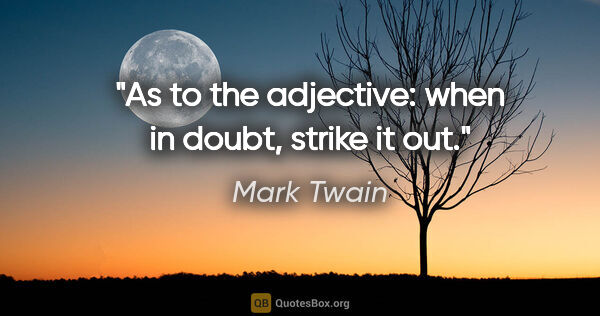Adjectives Quotes (page 2)
If words had cost money, Tom couldn't have used them more sparingly. The adjectives were purely descriptive, relating to form and colour, and were used to present the objects under consideration, not the young explorer's emotions. Yet through this austerity one felt the kindling imagination, the ardour and excitement of the boy, like the vibration in a voice when the speaker strives to conceal his emotion by using only the conventional phrases.
Willa Cather
There is no sadness and no cruelty in that gaze; it is a gaze without adjectives, it is only, completely, a gaze which neither judges you nor appeals to you; it posits you, implicates you; makes you exist. But this creative gesture is endless; you keep on being born, you are sustained, carried to the end of a movement which is one of infinite origin, source, and which appears in an eternal state of suspension.
Roland Barthes
Are you familiar," he said finally, "with the Bang?"The Big Bang?" Luka asked. "Or some other Bang I don't know about?"There was only one Bang," said Nobodaddy, "so the adjective Big is redundant and meaningless. The Bang would only be Big if there was at least one other Little or Medium-Sized or even Bigger Bang to compare it with, and to differentiate it from.
Salman Rushdie

Whatever language we speak, before we begin a sentence we have an almost infinite choice of words to use. A, The, They, Whereas, Having, Then, To, Bison, Ignorant, Since, Winnemucca, In, It, As . . . Any word of the immense vocabulary of English may begin an English sentence. As we speak or write the sentence, each word influences the choice of the next its syntactical function as noun, verb, adjective, etc., its person and number if a pronoun, its tense and number as a verb, etc. ,etc. ...
Ursula K. Le Guin
And there was never a better time to delve for pleasure in language than the sixteenth century, when novelty blew through English like a spring breeze. Some twelve thousand words, a phenomenal number, entered the language between 1500 and 1650, about half of them still in use today, and old words were employed in ways not tried before. Nouns became verbs and adverbs; adverbs became adjectives. Expressions that could not have grammatically existed before - such as 'breathing one's last' and...
Bill Bryson
- 1
- 2




